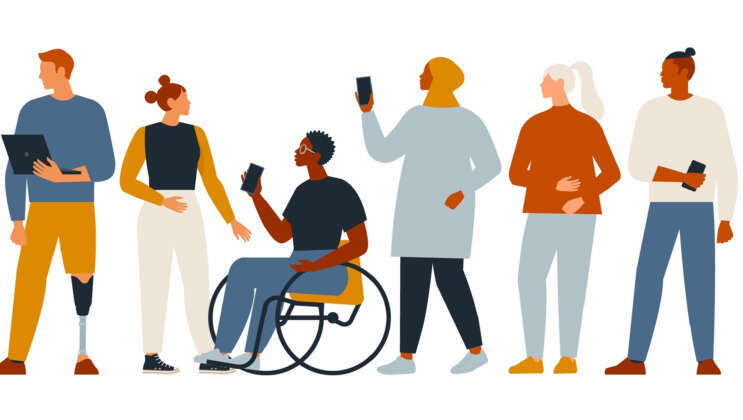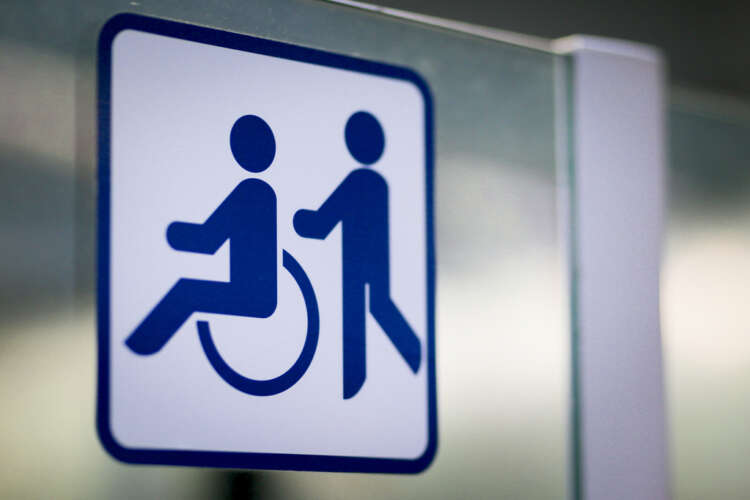
Ευρωκοινοβούλιο: Αλλαγή νοοτροπίας για τα Δικαιώματα ατόμων με αναπηρία
Σε έκθεση που υιοθετήθηκε από την Ολομέλεια του Ευρωπαϊκού Κοινοβουλίου την Τρίτη με 526 ψήφους υπέρ, 10 κατά, και 83 αποχές, το Κοινοβούλιο διατύπωσε τις προτάσεις του για την υπεράσπιση των δικαιωμάτων των ατόμων με αναπηρία και για την αντιμετώπιση των διακρίσεων, μέτρα τα οποία θα μπορούσαν να επαναπροσδιορίσουν το κοινωνικό, νομικό και πολιτικό πλαίσιο των δικαιωμάτων των ατόμων με αναπηρία, και να συνεισφέρουν στην εξάλειψη στερεοτύπων, διακρίσεων υπέρ ατόμων χωρίς αναπηρία και λανθασμένων αντιλήψεων.
Τρία είναι τα βασικά σημεία της θέσης του Κοινοβουλίου:
- Καλύτερη χρήση των ευρωπαϊκών κονδυλίων, καμία χρηματοδότηση σε δομές απομόνωσης
- Χρειάζονται ευρωπαϊκοί κανόνες για την κοινωνική ένταξη και τις προσβάσιμες κοινότητες
- Κάλεσμα για ευρωπαϊκή νομοθεσία για χώρους εργασίας χωρίς αποκλεισμούς
Οι ευρωβουλευτές τάσσονται υπέρ ενός συστήματος που θα προωθεί την κοινωνική συμμετοχή, παραδείγματος χάρη μέσω προσβάσιμων κοινοτήτων που θα είναι σε θέση να παρέχουν τις απαραίτητες υπηρεσίες και τη φροντίδα που χρειάζονται τα άτομα με αναπηρίες σύμφωνα με την σχετική ευρωπαϊκή στρατηγική. Οι ευρωβουλευτές ζητούν επίσης να διευρυνθούν τα οφέλη της ανακοινωθείσας ευρωπαϊκής κάρτας αναπηρίας και η θέσπισή της να καταστεί υποχρεωτική για τα κράτη μέλη, όπως και μέτρα για εκπαίδευση και περίθαλψη χωρίς αποκλεισμούς.
Μεταρρύθμιση και επέκταση των κανόνων της ΕΕ
Η πρόσβαση στην αγορά εργασίας είναι κρίσιμης σημασίας στην προσπάθεια αυτή, τονίζει το ΕΚ. Η Επιτροπή θα πρέπει να αναπτύξει ένα ευρωπαϊκό νομικό πλαίσιο για επιχειρήσεις χωρίς αποκλεισμούς και να αρχίσει την αναθεώρηση της οδηγίας για την ισότητα στην απασχόληση.
Ζητά επίσης από την Επιτροπή να επικαιροποιήσει την πρόταση οδηγίας της ΕΕ για την ίση μεταχείριση, η οποία έχει μπλοκαριστεί από τα κράτη μέλη από το 2008.
Το Κοινοβούλιο εκφράζει την ικανοποίησή του για τον επικείμενο έλεγχο του Ευρωπαϊκού Ελεγκτικού Συνεδρίου σχετικά με τον τρόπο με τον οποίο τα κονδύλια της ΕΕ συμβάλλουν στη διασφάλιση της ισότητας και καλεί την Επιτροπή να αναστείλει ή να ανακαλέσει πληρωμές σε περίπτωση παραβίασης των θεμελιωδών δικαιωμάτων, τονίζοντας ότι δεν θα πρέπει να δίνονται κονδύλια της ΕΕ σε δομές ιδρυματικής φροντίδας.
Περίπλοκες διακρίσεις και μορφές βίας
Η περαιτέρω εμβάθυνση των διακρίσεων κατά των ατόμων με αναπηρία με βάση άλλα χαρακτηριστικά (π.χ. φύλο, φυλή, ηλικία, θρησκεία ή γενετήσιος προσανατολισμός) ανησυχεί επίσης βαθιά τους ευρωβουλευτές. Ιδιαίτερη αναφορά γίνεται στην έμφυλη βία, καθώς και στην άρνηση πρόσβασης σε δομές σεξουαλικής και αναπαραγωγικής υγείας, στην άρνηση αναγνώρισης δυνατότητας συναίνεσης μετά από ενημέρωση σχετικά με τη χρήση αντισυλληπτικών και στην αναγκαστική στείρωση.
Οι ευρωβουλευτές υποστηρίζουν επίσης ότι τα άτομα με αναπηρία πρέπει να έχουν τη δυνατότητα να ψηφίζουν και να εκλέγονται σε ισότιμη βάση. Στην περίπτωση Ευρωπαίων πολιτών που ζουν σε άλλη χώρα της ΕΕ, οι αποφάσεις για τη στέρηση της δικαιοπρακτικής τους ικανότητας, δηλ. του νόμιμου δικαιώματός τους να λαμβάνουν τις δικές τους αποφάσεις, που λαμβάνονται στο κράτος μέλος καταγωγής τους δεν θα πρέπει να τους αποκλείουν αυτόματα από τις εκλογές στον τόπο διαμονής τους, υπογραμμίζουν οι ευρωβουλευτές.
Δηλώσεις
Η εισηγήτρια Anne-Sophie Pelletier (Αριστερά, Γαλλία) δήλωσε: «Για πολύ μεγάλο χρονικό διάστημα, οι δυσκολίες των ατόμων με αναπηρία αγνοούνταν στην ΕΕ. Είναι πολίτες των οποίων τα δικαιώματα παραβιάζονται σε καθημερινή βάση. Ήρθε η ώρα αυτό να αλλάξει και χαίρομαι που η συζήτηση για την παρούσα έκθεση μπορεί να σηματοδοτήσει ένα βήμα προς τα εμπρός για την επίτευξη πραγματικής ισότητας για όλους.»

European Parliament adopts report on equal rights for persons with disabilities – Parliament calls for a paradigm shift
In the report adopted on Tuesday (526 votes in favour, 10 against, and 83 abstentions), the Members of the European Parliament propose measures that would reinvent the social, legal, and political framework for disability rights, and help eradicate stereotypes, ableism and misconceptions.
They call for a system that promotes social participation, i.e. one based on accessible communities that provide the services and care needed, in line with the European Disability Strategy. MEPs also demand that the benefits of the upcoming EU Disability Card should be expanded and that its introduction should be an obligation for member states, as should measures for inclusive mainstream educational settings and healthcare.
The report calls for the adoption of several measures necessary to implement the rights of persons with disabilities:
- The adoption of the horizontal health treatment directive
- A reform of the European Electoral Law and more global reforms of political systems to ensure all persons with disabilities have the right to vote and stand for election
- A legislative act to expand the EU Disability Card to cover a range of different areas beyond culture, leisure and sport
- A revision of the Employment Directive, in particular as regards harmonised minimum standards for reasonable accommodations for workers with disabilities
- An implementation plan for disability-inclusive disaster risk management at EU level
- The accession to the Istanbul Convention on combating violence against women and domestic violence
Other issues addressed in the report:
- Addressing the rights of persons with disabilities most a risk of violation of their rights, abuses and violence: intersectionality is at the core of the recommendations, with specific consideration to women and girls with disabilities, including when it comes to gender-based violence, and abuses such as forced contraception and forced sterilisation.
- Equal recognition before the law: legal capacity and equal recognition before the law is another priority issue addressed by the report. The MEPs call on the Commission and Member States to reform their legal systems to abolish restrictions on the legal capacity of persons with disabilities and replace substituted decision-making regimes by supported decision-making.
- Promoting inclusive education: the report highlights the importance of education and MEPs call on the Commission and Member States to take measures to facilitd the enjoyment of inclusive, quality education, including e-learning and lifelong learning, for all learners with disabilities.
- Ensuring quality and accessible healthcare: the obligation to provide equal access to quality and free or affordable healthcare services to persons with disabilities is also emphasised in the text of the report. MEPs refer to several EU measures and initiatives such as the EU Beating Cancer Plan and the Cross-Border Health Car

In March 2021, the European Commission adopted the Strategy for the rights of persons with disabilities 2021-2030. The Strategy builds on the results of the previous European Disability Strategy 2010-2020, which paved the way to a barrier-free Europe and to empower persons with disabilities so they can enjoy their rights and participate fully in society and economy.
Despite the progress made in the past decade, persons with disabilities still face considerable barriers and have a higher risk of poverty and social exclusion.
The objective of this Strategy is to progress towards ensuring that all persons with disabilities in Europe, regardless of their sex, racial or ethnic origin, religion or belief, age or sexual orientation enjoy their human rights, have equal opportunities, equal access to participate in society and economy, are able to decide where, how and with whom they live, move freely in the EU regardless of their support needs and no longer experience discrimination.
The EU and its Member States are committed to improving social and economic situation of disabled people building on the Charter of Fundamental Rights of the EU and on the Treaty on the Functioning of the EU. The European Union and all its Member States are party to the United Nations Convention on the Rights of Persons with Disabilities (UNCRPD).
The objective of this Strategy is to progress towards ensuring that all persons with disabilities in Europe, regardless of their sex, racial or ethnic origin, religion or belief, age or sexual orientation
- enjoy their human rights
- have equal opportunities, equal access to participate in society and economy
- are able to decide where, how and with whom they live
- move freely in the EU regardless of their support needs
- and no longer experience discrimination
This new and strengthened Strategy takes account of the diversity of disability comprising long-term physical, mental, intellectual or sensory impairments (in line with Article 1 of the United Nations Convention on the Rights of Persons with Disabilities), which are often invisible.
Addressing the risks of multiple disadvantage faced by women, children, older persons, refugees with disabilities, and those with socioeconomic difficulties, it promotes an intersectional perspective in line with the United Nations 2030 Agenda for Sustainable Development and Sustainable Development Goals (SDGs).
The new strategy therefore contains an ambitious set of actions and flagship initiatives in various domains and has numerous priorities, such as
- accessibility: being able to move and reside freely but also to participate in the democratic process
- having a decent quality of life and to live independently as it focuses notably on the de-institutionalisation process, social protection and non-discrimination at work
- equal participation as it aims to effectively protect persons with disabilities from any form of discrimination and violence, to ensure equal opportunities in and access to justice, education, culture, sport and tourism, but also equal access to all health services
- the role of the EU to lead by example
- the EU’s intention to deliver on that strategy
- promoting the rights of persons with disabilities globally

Αφήστε μια απάντηση